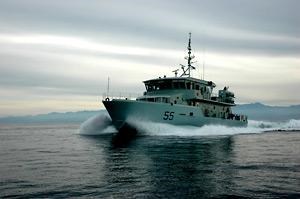One of the Canadian navy’s new steel-hulled patrol boats will be making a stop in Powell River for this year’s Sea Fair and visitors are invited to go aboard for a tour.
The 33-metre Orca-class vessel will be docked on float number 10 in the south harbour for tours from 1 to 4:30 pm on Saturday, July 26. Access to the float is from the old barge terminal, said Dave McLennan, Sea Fair committee director for maritime activities.
The vessel is coming over from HMCS Quadra, the sea cadet training facility in Comox, said McLennan.
The 210-tonne patrol boats are based out of CFB Esquimalt and are used for training naval officers and sea cadets.
According to information from the Department of National Defence (DND), the vessels serve as an ideal training platform because of their bridge simulator which allows officers and sailors to obtain training for much larger vessels in conditions similar to real-time environments.
There is accommodation for a crew of four and 16 students on board.
Although the boats were designed with junior officer training in mind, they also provide a secondary patrol capability for the west coast. The high speed and excellent manoeuvrability allows the vessels to conduct port security, search and rescue, exercises and other duties.
In November 2004, DND placed a $69.7-million order with Victoria Shipyards Company Limited, a specialist division of Seaspan Marine Corporation, to build six new ships with the option of adding two more. They were designed to replace the aging wooden-hulled Yard Auxiliary, General training vessels. Between 2006 and 2008 eight ships were launched at a total cost of $86 million.
The original six are called PCT (Patrol Craft Training) 55 Orca, PCT 56 Raven, PCT 57 Caribou, PCT 58 Renard, PCT 59 Wolf, and PCT 60 Grizzly, plus the two newly added vessels PCT 61 Cougar and PCT 62 Moose.
The ships, though owned and operated by DND, are not in commission with the Royal Canadian Navy (RCN), so their names do not include the navy prefix HMCS (Her Majesty’s Canadian Ship). The vessels are all named after animals and according to RCN Commodore David Gagliardi were chosen to “remind us of the original sailors on the Pacific coast of North America, the Coast Salish first nations people.”



